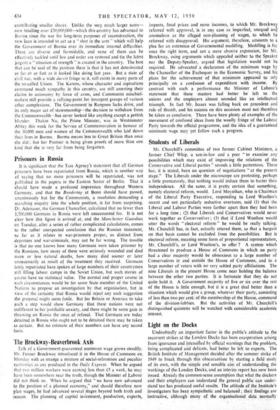Students of Liberals
Mr. Churchill's committee of two former Cabinet Ministers, a former Chief Whip, a son-in-law and a peer " to examine any possibilities which may exist of improving the relations of the Conservative and Liberal parties " sounds a little portentous. There has, it is stated, been no question of negotiations " at the present stage." The Liberals under the microscope are protesting, perhaps a little prematurely, that nothing would induce them to barter their independence. All the same, it is pretty certain that something, namely electoral reform, would. Lord Moynihan, who is Chairman of the Liberal Party Executive, responding to Lord Woollon's recent and not particularly seductive overtures, said (1) that -the Liberal and Labour Parties were farther apart than they had been for a long time ; (2) that Liberals and Conservatives would never work together as Conservatives; (3) that if Lord Woolton would utter the words " electoral reform " he would be really talking. Mr. Churchill has, in fact, actually uttered them, so that a bargain on that basis cannot be excluded from the possibilities. But is electoral reform, meaning some form of proportional representation, Mr. Churchill's, or Lord Woolton's, to offer ? A system which threatened to produce -a House of Commons in which no party had a clear majority would be obnoxious to a large number of Conservatives in and outside the House of Commons, and to a large number of voters with no very settled party affiiliations. The nine Liberals in the present House come near holding the balance between the other two parties. It is fortunate that they do not quite hold it. A Government majority of five or site over the rest of the House is little enough, but it is a great deal better than a situation which would give a group, whatever their party, consisting of less than two per cent. of the membership of the House, command of the division-lobbies. But the activities of Mr. Churchill's distinguished quintette will be watched with considerable academic interest.






































 Previous page
Previous page